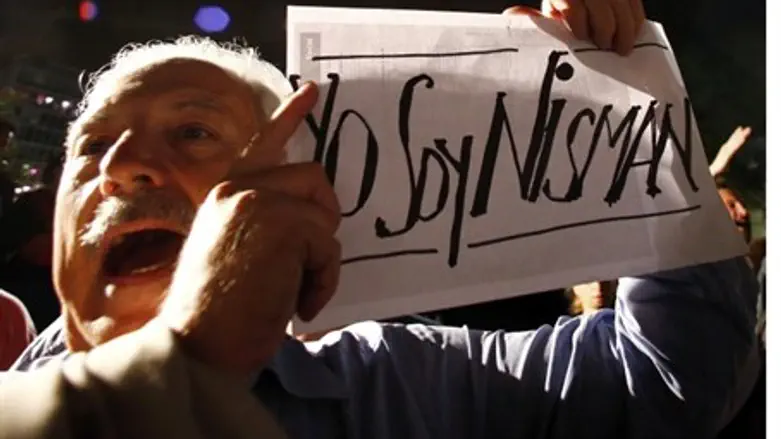
Argentina's President Cristina Kirchner Wednesday faces her first mass protest - a silent march to be led by prosecutors and opposition leaders - over the mysterious death of a prosecutor who accused her of a cover-up in a 1994 bombing, AFP reports.
As many as 300,000 people were expected to turn out for the march, marking one month since the unexplained death of prosecutor Alberto Nisman in a case that has ignited a political firestorm in Argentina.
Among those who have said they would attend are Nisman's two young daughters and his ex-wife, Judge Sandra Arroyo Delgado.
Nisman was found in his Buenos Aires apartment with a bullet through his head on January 18, the day before he was to go before a congressional hearing to air his finding that Kirchner and her foreign minister plotted to shield Iranian officials implicated in the bombing of the AMIA Jewish-Argentine charity.
Eighty-five people were killed and more than 300 injured in the attack, the deadliest in Argentina's history and one that has yet to be solved 21 years later.
Police said Wednesday's march, set to begin at 2100 GMT, will start at the Congress and end in front of the presidential palace in the Plaza de Mayo.
Top Kirchner aides denounced it as an attempt to destabilize the government and suggested that the United States and Israel were trying to drag Argentina into the Middle East conflict.
Kirchner and her cabinet were leaving the city ahead of the march for a ceremony highlighting the expansion of a nuclear power plant, Atucha II, in Zarate, 115 kilometers (70 miles) north of Buenos Aires, cabinet chief Jorge Capitanich said.
Investigators initially said the death of the 51-year-old Nisman appeared to be a suicide.
But homicide has not been ruled out, although Nisman was found sprawled in the bathroom, with his back blocking the door and a .22-caliber pistol next to him. He was killed with a single shot to his temple.
In Argentina, the suicide theory is widely disbelieved - even by Kirchner, who has suggested that he was killed by former intelligence agents in an elaborate plot to smear her.
Nisman had accused Kirchner four days before his death of obstructing his investigation by cutting a secret deal with Iran in exchange for oil.
Iranian suspects
In 2005, with the support of former president Nestor Kirchner, the current president's late husband, Nisman had charged that the bombing was carried out by Hezbollah with the involvement of top Iranian officials, including former president Akbar Hashemi Rafsanjani.
In 2013, Cristina Kirchner reached a deal with Iran that would have allowed Iranian suspects to be questioned at home, but that agreement never materialized.
Nisman and Argentina's large Jewish community were vehemently opposed, arguing that Tehran could not be trusted.
In his accusation against Kirchner, which was reaffirmed on Friday by his replacement, Gerardo Pollicita, Nisman said the Argentine leader was working behind the scenes to protect the Iranians, in return for Iranian oil at a time when the South American country was in the midst of an energy crisis.
He also alleged that Kirchner asked Interpol to lift outstanding "red notices" against the Iranians - a request that was denied.
"There is no evidence that shows that the president or the (foreign) minister or anyone else offered impunity to the authors of the attack," said Luis Moreno Ocampo, the former chief prosecutor of the International Criminal Court.
Even so, Moreno Ocampo said the march should be held to press for "reformulating the intelligence services, which come from the time of the dictatorship (1976-83) and are unacceptable in a democracy."
Kirchner has ordered the disbanding of the Intelligence Secretariat, but the left has protested that the agency that replaces it will use the same discredited personnel.
Wiretaps
Nisman's evidence was based on wiretaps carried out by intelligence agents without the permission of the judge in the case, Rodolfo Canicoba Corral.
They include intercepted telephone conversations in which a leader of Kirchner's political faction is heard discussing favors to the Iranians with an Argentine member of Buenos Aires' Iranian community.
Public opinion is divided between those who believe Kirchner ordered Nisman to be murdered and those who see his accusations as far-fetched and part of a bid to pressure for early elections.